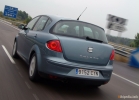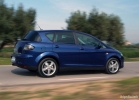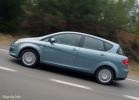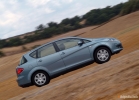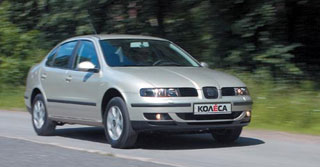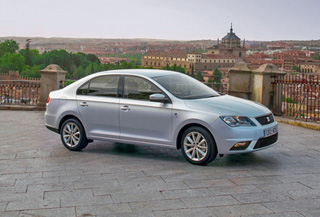SEAT TOLEDO test drive since 2004 sedan
They did not agree on character
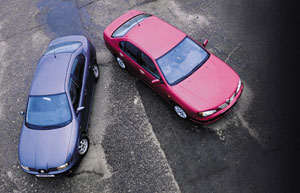 We had the opportunity to test the new generation Seat Toledo. Since everything is better known in comparison, the car needed an opponent. And he is there - the new Nissan Primera. Some, however, considered that it would be a game of one gate, predicted an unconditional victory to the Japanese - a more eminent, moreover, in terms of sales in the segment D is one of the market leaders. TOLEDO is the brainchild of one of the youngest automakers (this year it turned 50), and the SEAT products have not yet been particularly popular with us. But in the course of the fight, interesting details began to be clarified ...
We had the opportunity to test the new generation Seat Toledo. Since everything is better known in comparison, the car needed an opponent. And he is there - the new Nissan Primera. Some, however, considered that it would be a game of one gate, predicted an unconditional victory to the Japanese - a more eminent, moreover, in terms of sales in the segment D is one of the market leaders. TOLEDO is the brainchild of one of the youngest automakers (this year it turned 50), and the SEAT products have not yet been particularly popular with us. But in the course of the fight, interesting details began to be clarified ... Until recently, Russia and Nissan were not direct competitors in Russia. The old Toledo model was very inferior to Japanese, and European classmates in equipment, and its outdated design of the 80s simply scared away buyers. However, after the SEAT transition to Volkswagen patronage, the situation began to change rapidly. Now, according to the press releases, all new models of the company belong to the category of Driver's Car - cars for the driver. From the Seat, they make a almost sports department Volkswagen ...
Second generation Seat Toledo, which debuted last fall, appeared in Russia this spring. With his predecessor (1992-1999), the car unites only kinship with the Volkswagen concern. The Toledo sedan (the Hatchback version is named Leon) is based on the Volkswagen Golf IV units - hence the main technical characteristics. A car is produced at the Volkswagen factory in Belgium, in the same place as the Bora sedan.
The first external impressions are very pleasant - dynamic and at the same time solid design. The car confidently holds on the legs - cast 15 -inch discs shod in low -profile rubber. At the same time, he sits relatively low, which portends good handling. In the profile, Toledo resembles the Alfa Romeo model and massive trunk, and this is no coincidence - Walter de Silva, who previously headed the Alfa Romeo style center, worked on its design.
The face is expressive, its features make you recall the last concept of the Seat. In the focus of attention, in the middle of the false radiator lattice, a large emblem of the company in the form of the letter S. The opening of the lattice visually pass into narrow headlights. The outlines of doorways, especially the rear, are a hint of Skoda Octavia. The decision is purely Ceatovskoye: two large lanterns are combined with each other with a jumper that enveloping the number of a license plate. In the jumper there is an additional stop signal. In general, the appearance of Toledo can be called male, dark colors will be this car to the face.
The second participant in the test is Nissan Primera. The company gives it as a completely new car, although in fact it is the result of the recent generation Primera restyling, the production of which began in 1996. The usual practice of the mass car manufacturer is a serious update to the model in the middle of its output.
A radically altered front is striking - slanting headlights and a falling hood beak with inflated nostrils of an integrated false radiator lattice into it. Very reminiscent of the updated Renault Megane. But it is unfair to blame Nissan designers of plagiarism - Primera restyled work began long before Megana. And he appeared six months after the release of the modernized Rimera. But still it is difficult to get rid of the thought of a single corporate identity of the United company Renault-Nissan.
The sidewall of the body remained the same, not counting the developing molding on the doors and the new lateral mirrors of the rear view. The back, like the front, underwent noticeable changes - new rounded lanterns and a trunk lid with an integrated visor appeared. At the same time, originality was added - the car, without a doubt, acquired recognition.
In terms of dynamic appearance, the Japanese is inferior to the Spaniard. Probably, the ground clearance plays an important role here - Primera sits noticeably higher than toledo. The appearance of Primera turned out to be too playful, one might say - Pighon, which is quite strange for a car of this class. TOLEDO looks more solid: massive sides and back, a predatory front end creates a aura of thoroughness and reliability, and the aggressive squint of the headlights makes neighbors respectfully give way ...
And what about the salons? Let's start with Toledo. The key is equipped with a central locking control buttons. The door opens with a tangible effort, while securely fixed in several positions. But it closes easily, you do not need to clap. Sit behind the wheel, you immediately understand that under you is a German seat: hard, with developed lateral support and a relatively long pillow. There are three standard adjustments - in length, height and angle of inclination of the back. The salon is made in dark colors - close to black shades with dark blue fabric inserts on the doors and seats. The ceiling and racks stand out - they are almost white. I liked the rough oilcloth material on the upper surfaces of the torpedo - inexpensive and practical, while not devoid of originality.
As expected, the front panel was borrowed from Volkswagen Golf. The interior was worked out very carefully - from the point of view of both ergonomics and the materials used. The governing bodies are easily accessible, informative, the efforts necessary for their work are optimal. Indications of devices are easily read. The original protection from the theft of a proprietary car radio was original - only a small segment with the settings memory buttons was removable, for it there is a special case -cords.
I liked the steering wheel with its size and shape, there is an adjustment on the angle of inclination. It is sheathed with genuine leather - it's nice to hold in his hands. The location of other governing bodies is common and does not require a detailed description. The glove box located in the lower part of the panel (in the upper - airbag) has a decent volume, but completely open it if the passenger sits in front, it is difficult - the lid rests on the knees.
Two will be comfortably located in the back seat, the three of them are crowded. The seat folds in parts and has a built -in armrest with a container inside. Back access is not quite convenient - the leg clings to the sheathing of the rear door, where the stereo system is located. In general, I liked the interior, especially in front: excellent quality, cozy, comfortable, with a strict design.
Primera doors open with less effort, but they close worse - at first it was not possible to slam them the first time. Salon is a direct opposite of the TOLEDO interior, in bright colors, spacious. The front seats are very soft, plush, and although they visually have good side support, in fact you do not feel it - in stressful turns it remains only to hold on to the wheel. If you forget about this lack, then landing can be said, especially since there is an adjustment of a lumbar support, while even a person will easily and quickly select even a person in two meters - the adjustments allows. The instrument panel, which has changed barely noticeably, does not fit with the expressive appearance of Primera, and the quality of execution leaves much to be desired. They surprised fabric inserts on the doors and seats: with an inappropriate children's pattern, dirty gray-it seems that they were borrowed from some battered car. Against the background of this, a plastic insert under the tunnel and chrome door handles look like kichevo.
The steering wheel, of course, is adjustable - along the corner of inclination, also sheathed with genuine leather, although rudely. We got a car without a radio, instead of it - a gaping hole in the central console with a protruding bracket. An impressive gap between the torpedo and the sheathing of the driver's door is striking - apparently, they decided to save and not adjust it under the outline of the front panel (its right and left edges are not the same) in order to use it for right -handed versions.
The gearbox lever is located far - when the fifth gear is turned on, you have to tear off the right shoulder from the back of the seat. But the backward access is more convenient than in Toledo, and it is more devastated there - in length, which is width, and even the three of them. In general, the impressions of the cabin are not bad, although they are spoiled by the quality of performance - given the appearance of Primera, you are waiting for more ...
Neither the other machine is adapted for our market, but the Spaniard has the covers so necessary for Russian winter, but they have no Japanese.
For the purity of the experiment, we chose cars with the same working volumes of engines - 1.8 liters (it is worth noting that TOLEDO with more powerful engines - 1.8 Turbo and VR5 - are not yet supplied to Russia). The Nissan Primera has a completely new engine equipped with a NVCS gas distribution phase system (Nissan Valve Timing Control System). Both cars have a front wheel drive. Seat Toledo is presented in the Sport configuration, and Nissan Primera is performed by Elegance, while the first we got without air conditioning, and the second, as already mentioned, is without a stereo system.
What do we see under the hoods? First of all, a significant difference in the design of the engine compartment. On the Seat, the engine on top is completely covered with a beautiful plastic casing, only a button and oil -wounded melting probe remained outside. The hood is equipped with a gas spring and sound insulation.
An interesting M-shaped lever is located on the box crankcase, with which you can switch the transmission. It is logical to assume that it is used in adjustment - even the highest quality cables stretch over time. With the help of this club, the mechanic on the service will be able to adjust the mechanism alone without leaving the engineering space.
The Primera motor compartment looks much simpler - so that it seems that they forgot to put a decorative cover at the factory, and all the contacts, connectors and connections were in sight. In addition, the motor compartment is not protected from below, so in winter Moscow salt can quickly deal with an electrician. The hood is without sound insulation and is held in an open position with a simple support.
The luggage compartment in both cars opens from the central castle. Toledo trunk struck with its size - it seems smaller from the outside. At the same time, everything is done qualitatively, no worse than in the salon. But Primera has already familiar problems: low quality, outgoing casing, cracks. Both the cars are equipped with full -sized reserves. Access to the spare wheel is more convenient for the Seat - the hard flooring is folded in parts, while Nissan has to be lifted as a whole, even if you need to get only the tool.
It's time to get acquainted with our experimental on the go. The Toledo engine is practically not heard on idle, vibrations are not felt. I paid attention to some dumping gas pedal, when it clicks it, the engine does not immediately gain momentum, and when released for a moment it thinks and only then lazily dumps them. With sequential short presses on the pedal, the engine simply unwinds monotonously - you can’t play with gas at traffic lights. The clutch drive is informative and predictable - we smoothly start off. Toledo accelerates evenly and intensively until the engine speed limiter is triggered. The motor pulls well from the bottom, in the region of 3500-4000 revolutions you feel a noticeable pickup, which will be very useful with intense overtaking. Switching transfers is clear and unambiguous, with small moves, it is simply impossible to make a mistake. The gearbox drive is so good that there is no desire to ride in a lice, more often worrying the lever of the box - I want to switch more often.
For Toledo, everything is perfectly balanced: successfully selected gear rates, a clear operation of the gearbox, comfortable controls. After a couple of minutes of meeting on the move, you feel that all your life only on this car and drove. The steering was pleased with its informativeness, it becomes more acute with a set of speed, although someone may not like it.
The Toledo suspension is quite stiff, at low speed on small irregularities the car is noticeably shaking. As accelerating, the rigidity becomes optimal, and the large energy intensity of the suspension allows you to especially not think about the possibility of breakdown. As for acoustic comfort, the engine noise is mainly annoyed, even at high speed it is dominant. Although when active driving, listening to the engine is not so unpleasant, especially since sports notes appear at high speeds in its sound. On Toledo, you are happy to go around - it confidently clings to the road, provoking speed to a set of speed and reluctant gliding out of turn. In ultimate cases, the demolition of the front axle begins, however, easily controlled, but the skid on dry asphalt can only be special techniques - Dunlop resists to the last. The brake dynamics is worthy of praise, but ABS interferes rather rudely, with strong tremors on the pedals.
When we moved to Nissan, we immediately paid attention to the noisy engine at idle. Vibrations from it are transmitted to the lever of the checkpoint. At first, there were problems with touching - the clutch turns on too early, suggesting the incorrect adjustment. The engine pleased with its traction, especially on the bottom. It is not surprising, because it has an almost diesel peak of torque - 158 Nm at 2800 rpm., Thanks to the NVCS system mentioned above. Twist above 5500 about/min. It does not make sense, for normal acceleration, 4500-5000 rpm is quite enough. At the same time, there is no desire to make a lush - mainly due to the not very clear operation of the box lever, in addition, the sound of the engine at high speed acquires a not very pleasant loud timbre. There are comments on the steering, it is cotton - which is straight, in corners, and this causes some tension, especially at high speeds.
When driving in ordinary modes, the Japanese is very comfortable, in the cabin at least the noise - neither the engine, nor the tire, nor the runaway flow of air are annoyed. You can talk without raising your voice. I really liked the brakes, they are effective and confidently control the slowdown. In many ways, this is the merit of the Brake Assist mechanical system developed by Nissan. Brake Assist resembles more advanced and expensive electronic systems - with emergency braking, evaluating the speed of the pedal, the amplifier creates the pressure in the drive sufficient totor ABS. In practice, this is expressed in its early inclusion. ABS, by the way, works for glory - very softly, almost imperceptibly.
The suspension is softer than Toledo, and it is better to swallow small irregularities. Despite the large clearance that portends the appropriate suspension passages and energy intensity, they are still small - holes are noticed even with incomplete load. In quick turns, the car is very tenacious for the road (for which special gratitude to the Pirelli P6000 dimensions 195/65R15), but it is very fucked, as if warning that it was not created for extreme driving and that the limit is already close. If the warning is ignored, the smooth and easily predicted demolition of the front axis begins. PREMERA gas is calm, without surprises, it switches to a smaller radius ...
It's time to summarize. If we compare the quality of manufacture, the championship is clearly for TOLEDO. And at a price, the Spaniard is not very much, but wins: Toledo costs $ 20.500, and Primera - $ 21.700 (in almost the same trim levels).
But the main difference is in characters. In this regard, we also liked Seat Toledo more. A whole car in all respects, with ideologically verified filling and running qualities - with a sports accent. Seat Toledo is really a car for the driver, and makes it possible to fully enjoy the control process.
Nissan Primera is more suitable for people calm, first of all, comfort for whom the car is nothing more than a means of moving from point A to point B.
Text: Alexander Nadens, Sergey Yakubov
Source: Motor magazine [No. 8/2000]

